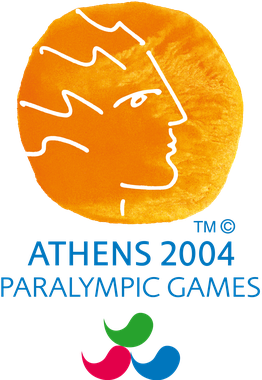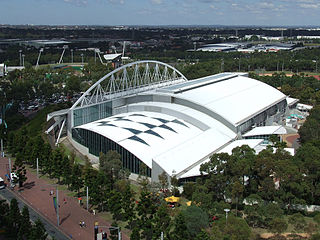
The 2000 Summer Olympics, officially the Games of the XXVII Olympiad, officially branded as Sydney 2000, and also known as the Games of the New Millennium, were an international multi-sport event held from 15 September to 1 October 2000 in Sydney, New South Wales, Australia. It marked the second time the Summer Olympics were held in Australia, and in the Southern Hemisphere, the first being in Melbourne, in 1956.

The 2004 Summer Paralympics, the 12th Summer Paralympic Games, were a major international multi-sport event for athletes with disabilities governed by the International Paralympic Committee, held in Athens, Greece from 17 to 28 September 2004. 3,808 athletes from 136 countries participated. During these games 304 World Records were broken with 448 Paralympic Games Records being broken across 19 different sports. 8,863 volunteers worked along the Organizing Committee.
Archery at the 2000 Summer Olympics was held at Sydney International Archery Park in Sydney, Australia with ranking rounds on 16 September and regular competition held from 17 to 20 September. One hundred twenty-eight archers from forty-six nations competed in the four gold medal events—individual and team events for men and for women—that were contested at these games.

At the 2000 Summer Olympics in Sydney, 46 events in athletics were contested, 24 for men and 22 for women. There were a total number of 2,134 participating athletes from 193 countries.

The swimming competitions at the 2000 Summer Olympics in Sydney took place from 16 to 23 September 2000 at the Sydney International Aquatic Centre in Homebush Bay. It featured 32 events, and a total of 954 swimmers from 150 nations.

The boxing competition at the 2000 Summer Olympics in Sydney, Australia was held at the Sydney Convention and Exhibition Centre in Darling Harbour. The event was only open to men and bouts were contested over four rounds of two minutes each. Five judges scored the fighters in real time and the boxer with the most points at the end was the winner.
The Weightlifting Competition at the 2000 Summer Olympics in Sydney, Australia saw the introduction of women's weightlifting.

Wrestling at the 2000 Summer Olympics took place in the Sydney Convention and Exhibition Centre and was split into two disciplines, Freestyle and Greco-Roman which are further divided into different weight categories. The freestyle competitions were held from 28 September to 1 October, and the Greco-Roman events were held from 24 to 27 September. In the freestyle 76 kg Alexander Leipold of Germany originally placed first, but was disqualified after he tested positive for Nandrolone.

This page shows the final results of the Judo competition at the 1996 Summer Olympics in Atlanta.

The Judo competition at the 1972 Summer Olympics was the return of the sport following its absence at the 1968 Summer Olympics in Mexico City. Medals were awarded in six weight classes, and competition was restricted to men only. Among the highlights was Wim Ruska of the Netherlands winning gold medals in both the heavyweight and open class competition, becoming the first judoka to win two Olympic gold medals.

Australia was the host nation for the 2000 Summer Olympics in Sydney. Australian athletes have competed in every Summer Olympic Games. 617 competitors, 341 men and 276 women, took part in 270 events in 34 sports.

Brazil competed at the 2000 Summer Olympics in Sydney, Australia. Brazilian athletes won twelve medals: six silver and six bronze, in the first Summer Olympics edition without a gold medal since the 1976 Summer Olympics. The 205 competitors, 111 men and 94 women, took part in 96 events in 23 sports.

The People's Republic of China competed at the 2000 Summer Olympics in Sydney, Australia. The team excluded athletes from the Special Administrative Region of Hong Kong, after the territory's return to Chinese rule in 1997, and which competed separately as Hong Kong, China.

South Korea competed as Korea at the 2000 Summer Olympics in Sydney, Australia. Athletes from North and South Korea marched together in the opening ceremony under the Korean Unification Flag. 281 competitors, 175 men and 106 women, took part in 144 events in 26 sports.

The Judo competition at the 1984 Summer Olympics continued the seven weight classes first used at the 1980 Games. With the open division, there were eight competitions. Powerhouse Japan returned to the top of the medal count after eight years, having boycotted the Moscow games. Because of the Soviet-led boycott of the Los Angeles games, several traditionally strong judo countries, including Cuba and the Soviet Union, did not participate. The Judo competition was held at California State University, Los Angeles.
At the 1996 Summer Olympics, two different wrestling disciplines were contested: freestyle wrestling and Greco-Roman wrestling.

The Judo competition at the 1992 Summer Olympics was contested in fourteen weight classes, seven each for men and women. The seven men's weight classes continued to be those first used in 1980. This was the first Olympic competition to award medals to women judoka; women competed in 1988 when women's judo was a demonstration sport.

Goalball is a team sport designed specifically for athletes with a vision impairment. Australia commenced its involvement in the sport in 1980. Its women's team has completed in trans-Tasman competitions, the IBSA World Goalball Championships, and the Paralympic Games.

Judo at the 2016 Summer Olympics in Rio de Janeiro took place from 6 to 12 August at the Carioca Arena 2 inside the Barra Olympic Park in Barra da Tijuca. Around 386 judoka competed in 14 events.

Judo was a sport at the 2020 Summer Olympics in Tokyo, and featured around 393 judoka competing in 15 events, seven each for both men and women as well as a new mixed team event. The 2020 Summer Olympics were postponed due to the COVID-19 pandemic, and the judo competitions were held in July 2021 at Nippon Budokan.
















